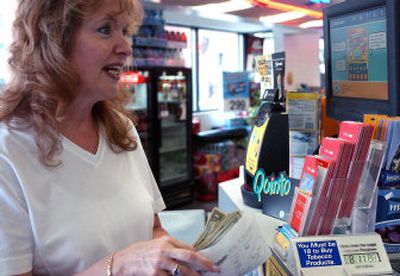Lottery players buying some hope for future

Janis Langdon lives alone in Millwood. Her husband, Bill, lives in Whitefish, Mont., where a good paying job for the railroad has kept them apart for five years.
Every time Langdon has talked of joining Bill, her employer has raised her pay just enough to keep her in Spokane Valley. Bill’s pay from Burlington Northern makes jobs in Spokane just out of reach.
It seems the two will have to retire to ever get back under one roof, but then Wednesday rolls around and Langdon pulls into the parking lot of the Albertsons at Trent and Argonne. She goes to the film counter and puts the numbers of her 20-year-old wedding date on the Washington Lottery.
“If I win, I would join him,” Langdon said of Bill. “I would retire now instead of in 10 ½ years. And I would do good things. There are so many people who have needs much more than mine.”
She gets back in her car and she daydreams like a traveler in a busy airport, waiting with a crowd of strangers for that one available seat to change their fortunes. And sometimes, when her day at work has gone poorly, she dreams of buying the business and showing up late on her first day as the new boss.
Stand in line at a lottery counter and the chatter will amaze you. The dreams are so much smaller than the elusive prize: to pay off a mortgage, to get a child through college, to finally bedeck mama in that jeweled crown and sable-trimmed, red velvet robe from the old NBC game show “Queen for a Day.”
There are 40-somethings in line with a dollar to spare and office pool go-fers testing the theory that there truly is strength in numbers. There also are desperate others who spend too much, gamble too much. They all buy hope.
“As remote as the chances are of getting something, I think it gives them hope,” said Stan Hughes, who started playing the lottery when Jimmy Carter was president. To date his best lottery win has been $700. “A lot of people, their lives are pretty hopeless, but if they buy a lottery ticket, at least until that night the hope is there.”
Once, Hughes’ friend Jim Dixon correctly picked the numbers for the $16 million Oregon lottery.
The number selection seemed almost divine. Dixon, who was living across the state line in Vancouver, had spent the night before telling the darkness over and over, “I want the numbers.” He awoke in the early morning and wrote them down. But the day of the drawing, he placed them on the Washington Lotto instead.
Hughes is known as somewhat of a human rabbit’s foot. He once won $40,000 playing slots, and a snowmobile raffle. His lottery winnings have been small, but winnings nonetheless.
“My wife says, ‘If you ever win, all I want is a million. Do whatever you want with the rest,’ ” Hughes said.
His own plan calls for spending the money on somebody else, to start a philanthropic organization for American Indians.
Langdon, too, speaks of luck, of having the propensity to be one in a million instead of one of the millions.
Once, as a child camping with seven cousins, Langdon was the only one to contract Rocky Mountain spotted fever.
You find luck where you can.
Should she win, Langdon has a list of promises made to family members over the years that reads like two decades of IOUs: an Atari video game console for a daughter who now has children of her own living in an Xbox world, a new house, a car that runs.
“My family thinks I”m goofy,” Langdon said. “My daughter did ask her psychic if I was going to win the lottery. She said, ‘no.’ “
But others, like Sally Heberling, swear their fortunes are not in tarot cards but in numbers.
Standing in line at the Lincoln Street and Second Avenue Shell station in Spokane, Heberling holds an envelope of ones, fives and quarters, the kitty for herself and 19 other women from the Sacred Heart Medical Center billing department.
They buy 60 tickets a week, 20 each on three different lotteries. All have pledged retirement if they hit the jackpot.
They’ll rent a stretch Hummer limo to drive across state to collect their prize. And Heberling will see to it that the dogs in the animal shelter get their due.
“You just wait and see Spokane, you’ll see the SHMC claims and collections on the news someday, I just know it,” Heberling said.
“We might all be toothless, gray-haired and near retirement, but by golly we’ll be winners in our rockers talking about all those $1 bills we spent three times a week for all those years.”
And with that, Heberling replaced the $20 in her office envelope with 20 tickets of distant hope.